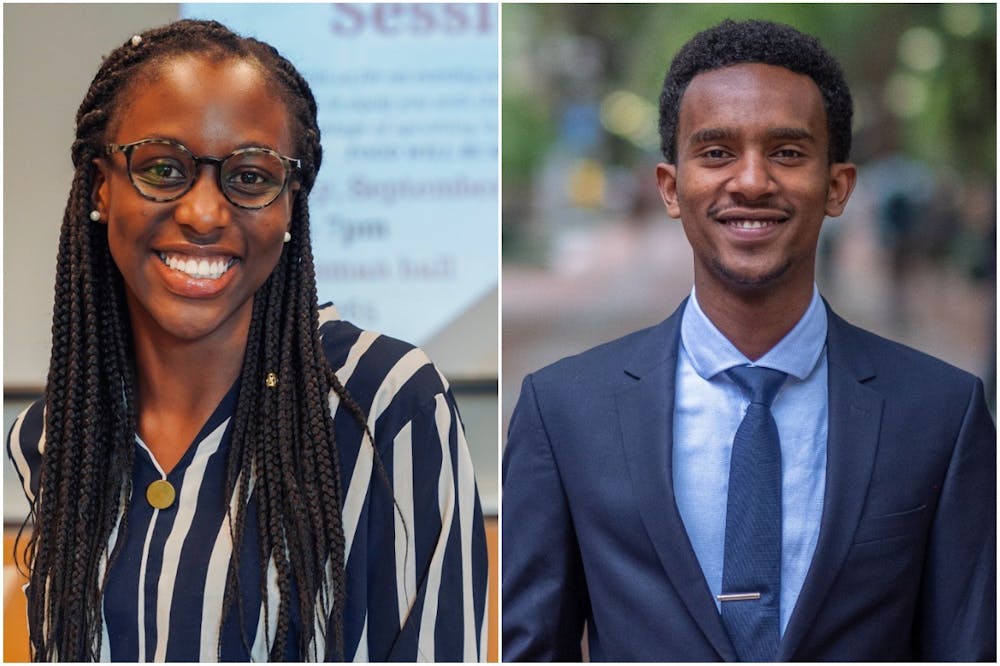
Frida Aloo (left) and Abenezer Mechale (right) created the AfroWellness Initiative. (Photos from Frida Aloo and Abenezer Mechale)
Two Penn students have created the Penn AfroWellness Initiative to de-stigmatize conversations about mental health among African international students.
College and Wharton senior Frida Aloo and Wharton senior Abenezer Mechale, who hail from Kenya and Ethiopia respectively, launched the organization after witnessing their friends struggle with mental health while being unaware of the available resources. Aloo and Mechale now facilitate bi-weekly meetings featuring open dialogue about the unique mental health challenges international students from Africa face.
The initiative is supported by the Society for African Internationals at Penn, a group with about 150 members, Mechale said. The initiative also partners with Counseling and Psychological Services for funding, outreach, and events that cater to current issues international students may face, like natural disasters in their home countries, according to Batsirai Bvunzawabaya, director of Outreach and Prevention Services at CAPS.
This semester, the AfroWellness initiative is holding events for managing stress and anxiety and discussing issues that have arisen due to the pandemic, like feeling isolated. Through SAIP, the initiative sends bi-weekly newsletters about mental health resources, articles about managing stress and anxiety, and surveys to gauge interest in events.
Aloo and Mechale said the difference in time zone poses a challenge this semester, but the group hopes to have both virtual and socially distanced in-person events.
Aloo, an international student from Kenya, said when she was a first-year, she had a hard time acclimating to the independence, academic pressures, and different culture and academic system in the United States. Facing racism and anti-Blackness in the United States is also one of the most difficult parts of adjusting to life at Penn, Aloo said.
“Back home, race is not a factor. I'm not saying racism does not exist in African countries, I'm just saying it's something I never thought about,” Aloo said, “I realized I was Black when I came to the U.S. Not necessarily that I didn’t know I was literally Black — my Blackness was very amplified. I was very conscious of it in all my interactions, in everything I was doing.”
After her friend recommended she see a therapist, she started learning about the names of the emotions and experiences she had, such as impostor syndrome. This exposure to these resources led Aloo to become passionate about mental health, she said.
Similarly, Mechale, an international student from Ethiopia, said he first learned about the usefulness of an open mental health dialogue during his first year when two of his friends experienced mental health issues.
Aloo and Mechale both said that in their experiences, mental health is neither taken seriously nor publicly discussed in their respective cultures. The goal of the AfroWellness Initiative is to promote discussion about these stigmatized topics, especially because African international students encounter a number of unique mental health challenges.
Yacob Tekie, Psychologist and Let’s Talk Counselor at CAPS, said many African students may be the lone person of color or Black student in certain programs. He added that high expectations from parents may also create a unique pressure, as they may not always understand the balance between mental health and work.
Mechale said many students may also be first-generation or low-income, which could contribute to impostor syndrome. Aloo said other common issues African international students face are homesickness, culture shock, and alienation because Penn is a predominantly white institution.
Although most international students are fluent in English, Bvunzawabaya said they may feel uncomfortable with how they are perceived when speaking. Additionally, the grouping of all African international students as ‘African’ can be difficult since many are from different nations and regions.
Mechale said although there’s a large diversity in cultures among African international students, he has found that because of their shared experience, he was able to easily connect with them. Mechale is one of four Ethiopians in his year but said he first found a community at Penn through SAIP.
Ultimately, Aloo and Mechale want the AfroWellness Initiative to promote the acceptability of seeking out mental health resources. Bvunzawabaya said these options could be connecting with an individual therapist, joining a student empowerment group, or participating in Let’s Talk.
For Mechale, his pre-orientation program, Successful Transition and Empowerment Program, was where he first learned about mental health resources. He said finding a group of students with a similar background has been a large part of his support system at Penn.
Bvunzawabaya and Tekie said it’s important that therapists approach international students with an understanding of their culture and of the stigma surrounding mental health.
In the future, Aloo said she hopes the AfroWellness Initiative expands in the number of participants and creates a sense of mentorship between underclassmen and upperclassmen. International students from other continents may face similar challenges, so she wants the AfroWellness Initiative to inspire the creation of a similar initiative for these groups.
“The first meeting we had was kind of awkward because people were just not really sure, like, ‘What are we supposed to talk about?’ Aloo said, “But as we went along, we noticed some people were even willing to mention and acknowledge, ‘This is a problem.’ [I’ve] noticed how the conversation is shifting, even among my friends, the people I interact with, it's like, people are able to talk openly, people are more open to utilizing CAPS as a resource.”
The Daily Pennsylvanian is an independent, student-run newspaper. Please consider making a donation to support the coverage that shapes the University. Your generosity ensures a future of strong journalism at Penn.
Donate







